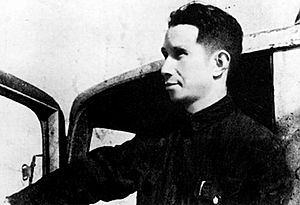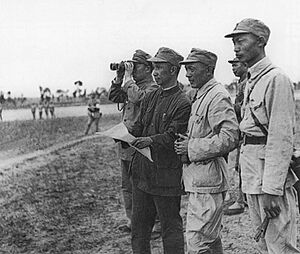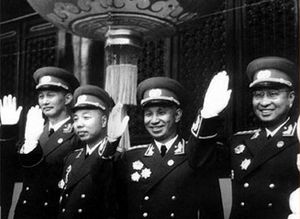Su Yu facts for kids
Quick facts for kids
Senior General
Su Yu
|
|
|---|---|
| 粟裕 | |
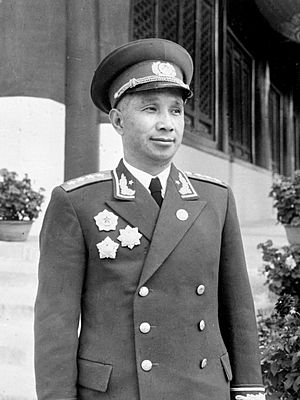
Su Yu in his Senior General uniform (1955)
|
|
| Personal details | |
| Born | August 10, 1907 Huitong County, Hunan Province, Qing Empire |
| Died | February 5, 1984 (aged 76) Beijing, People's Republic of China |
| Political party | |
| Awards | |
| Military service | |
| Allegiance | |
| Branch/service | |
| Years of service | 1927–1984 |
| Rank | Senior General of the People's Liberation Army |
| Commands |
|
| Battles/wars |
|
Su Yu (Chinese: 粟裕; pinyin: Sù Yù; August 10, 1907 – February 5, 1984) was a very important Chinese military commander. He was a general in the People's Liberation Army (PLA). Many, including Mao Zedong, thought he was one of the best commanders.
Su Yu played a key role in major conflicts. He fought in the Second Sino-Japanese War and the Chinese Civil War. During the Civil War, he led the East China Field Army. One of his biggest achievements was helping to capture Shanghai. After the war, he held important positions in the new Chinese government.
Contents
Early Life and Beginnings
Su Yu was born on August 10, 1907, in Huitong County, Hunan province. His family belonged to the Dong ethnic group. He was the third of six children. His family made a living from their farmland.
When he was 18, Su Yu went to the Hunan Provincial 2nd Normal School. This was for his education after high school.
Joining the Communist Party
In 1926, Su Yu joined the Communist Youth League of China. The next year, in 1927, he became a member of the Communist Party of China. He took part in the Northern Expedition, a military campaign. Later, he joined the Nanchang Uprising, an early Communist revolt.
He became known as a skilled guerrilla commander. This was during the 1930s in the Jiangxi Soviet, a Communist base area. Su Yu did not join the famous Long March. Instead, he stayed in southern Zhejiang to fight against Nationalist troops. He continued this fight until 1937.
Fighting in the Sino-Japanese War
The Second Sino-Japanese War began in 1937. Su Yu was made Deputy Commander of the 2nd Detachment. In April 1938, he became commander of the Advanced Detachment of the New Fourth Army.
During this war, Su Yu led his troops to important victories. He won the Cheqiao Campaign against the Japanese Army. His troops also won the first battle against Japanese forces at Weigang. He led other campaigns in Central Jiangsu against the Japanese in cities like Nanjing and Wuhu.
By the end of the war, Su Yu was a highly respected commander. He had won many battles against strong enemies. These enemies included the Japanese army, puppet regime forces, and the Kuomintang army. He was made Commander in Chief for the Communists' Central China Military Region. This covered a large area in East Central China.
Leading in the Chinese Civil War
During the Chinese Civil War, Su Yu started as the second-in-command of the East China Field Army. By the end of the war, he was second-in-command of the Third Field Army.
His early successes helped convince Mao Zedong to change military strategy. The Communist army moved from guerrilla tactics to more direct, conventional fighting. In July 1946, Su Yu led 30,000 Communist troops. They defeated 120,000 Nationalist troops in seven battles. This was known as the Central Jiangsu Campaign. It was one of many brilliant campaigns he led.
He was also the commander in the famous Menglianggu Campaign. In this battle, Su Yu's forces surrounded and destroyed an elite Nationalist division.
Huaihai Campaign
Su Yu was a main commander during the Huaihai Campaign. This major battle took place from November 1948 to January 1949. He suggested a clever strategy to his commanders. This strategy helped lead to a huge victory for the Communists.
In this campaign, five Nationalist armies were destroyed. About 550,000 Nationalist soldiers were either killed or captured. Su Yu's army alone destroyed four of these Nationalist armies. His leadership was key to this important victory.
After the People's Republic of China
When the Korean War started in 1950, many thought Su Yu would lead the Chinese troops. He had a lot of experience commanding large armies. However, he was ill from old injuries. So, Peng Dehuai was chosen to lead instead.
In 1955, Su Yu was given the rank of da jiang (Grand General). This was the highest rank given to only ten men. He held many important jobs. He was the Chief of the People's Liberation Army General Staff Department in the 1950s.
In his later years, Su Yu wrote a book called The Memoirs of Su Yu. He passed away in Beijing on February 5, 1984, at age 77. Following his wishes, his body was cremated. His ashes were scattered in the places where he had fought battles.
Su Yu's Family Life
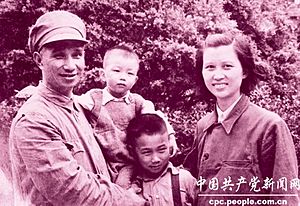
Su Yu married Chu Qing in February 1941. They had three children. All of their children later joined the PLA. Their oldest son, Su Rongsheng, was born in 1942. They also had another son, Su Hansheng, and a daughter, Su Huining. Their daughter married Chen Xiaolu in 1975. Chen Xiaolu was the youngest son of Chen Yi, who was Su Yu's superior during the war.
Su Rongsheng said his father was very strict. When Su Rongsheng was only three, Su Yu taught him to swim in a tough way. He gave him only a piece of bamboo to float with and pushed him into the water. He told everyone not to help him. His wife, Chu Qing, was upset. But Su Yu said it was the only way he would learn. Su Rongsheng joined the PLA at age 20. He served for 45 years and became a lieutenant general. He retired as a deputy commander-in-chief.
See also
- List of officers of the People's Liberation Army
 | Kyle Baker |
 | Joseph Yoakum |
 | Laura Wheeler Waring |
 | Henry Ossawa Tanner |


